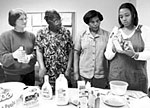Tip sheets highlight timely news and events at Washington University in St. Louis. For more information on any of the stories below or for assistance in arranging interviews, please see the contact information listed with each story.
‘When you can’t have it right away’
Psychology of gambling study has implications for self-control, impulsivity, risk-taking

Why do people engage in behaviors they know are harmful to them in the long run? Why do we give in to that incredible chocolate cake even though we’re trying to lose weight and stay fit? The answer, suggests a recent study on the psychology of gambling and impulsive behavior, is a simple economic phenomenon known as discounting. While good health may be its own reward, research suggests that the value of that reward diminishes as it’s delayed; and the longer it’s delayed, the less it controls your present behavior. Although gamblers may deserve their reputations as notorious risk-takers, they often do better than non-gamblers at delaying gratification to maximize long-term rewards.
Designing for aging eyes
From drug labels to Web sites, visual designers should keep older population in mind

Graphic design can be a matter of life and death. Literally. According to the Journal of the American Medical Association, more than 40 percent of Americans aged 65 and over use five or more different medications each week, making unintended drug interactions a major contributor to an estimated annual 180,000 fatal or life-threatening adverse drug reactions. Yet drug labeling is a kind of typographical Wild West, says Ken Botnick, professor of visual communications in the School of Art at Washington University in St. Louis. “Drug companies are required to divulge certain types of information but there are no requirements in terms of how accessible that information is made,” Botnick explains. “Typically, decisions about the way information is organized — the hierarchy of presentation, the size and clarity of type — are simply afterthoughts.” Medical information design is just one of the issues to be explored as part of “Visual Design for an Aging Population,” a national symposium Botnick is organizing in March 2004.
Poverty plays a role
High rate of depression found in African-American women at risk for type 2 diabetes

As the cases of type 2 diabetes in African-American women increase at an epidemic rate, researchers are examining risk factors involved with this disease in order to create programs that will hopefully slow this growing problem. According to a recent study at the George Warren Brown (GWB) School of Social Work at Washington University in St. Louis, African-American women at risk for type 2 diabetes experience long periods of depression due, in part, to a lack of economic and social resources. “At the beginning of our study, 40 percent of our sample of African-American women at risk for type 2 diabetes reported clinically significant depression,” says Wendy Auslander, Ph.D., professor at GWB and co-author of the study. “Unlike their nondepressed peers, these women reported fewer economic assets and greater economic distress. Issues such as unemployment, low self-esteem and a low appraisal of their economic situation contributed to their depression.”
‘Surprising little play’
20 years after his death, a Tennessee Williams’ work is staged for the first time

Twenty years after his death, one of Tennessee Williams’ plays is seeing the light of a stage for the first time. “Me Vashya,” an early play by Williams, will receive its world premiere at Washington University in St. Louis in February. Written in 1937 while Williams was a student here and known as Tom, his birth name, the play has remained in Washington University archives for more than 60 years. It has never been published or performed — until now.